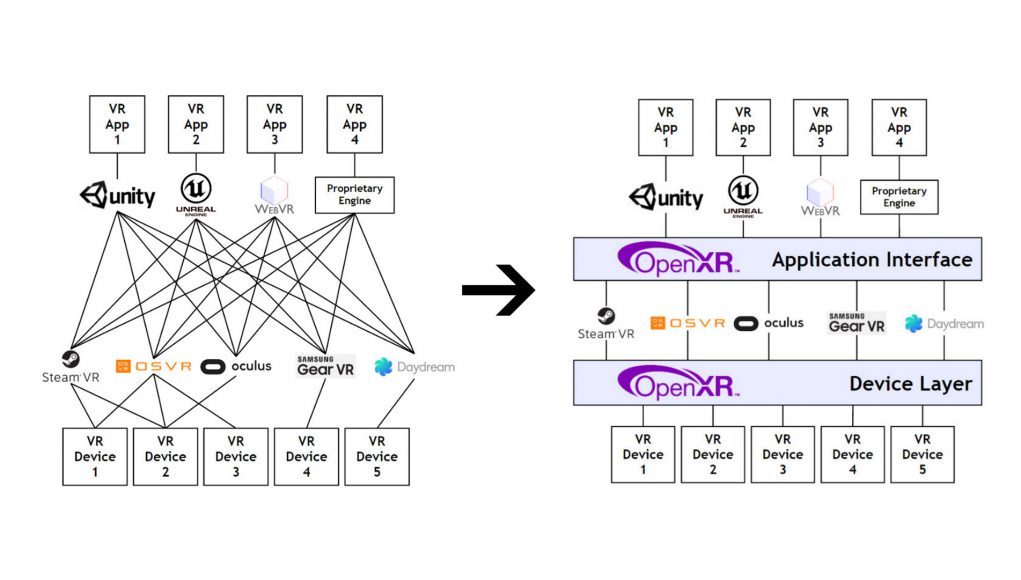 Valve’s Joe Ludwig talks about the latest updates on the Khronos Group’s VR standardization process that is now being called “OpenXR.” Ludwig says that OpenXR is still primarily creating an open and royalty-free open standard for virtual reality, but that they wanted to plan for the future and eventually accommodate augmented reality as well. In my Voices of VR interview with Ludwig, he talks about the OpenXR standardization process from Valve’s perspective and how they want to see VR become an open of a platform just as the PC has.
Valve’s Joe Ludwig talks about the latest updates on the Khronos Group’s VR standardization process that is now being called “OpenXR.” Ludwig says that OpenXR is still primarily creating an open and royalty-free open standard for virtual reality, but that they wanted to plan for the future and eventually accommodate augmented reality as well. In my Voices of VR interview with Ludwig, he talks about the OpenXR standardization process from Valve’s perspective and how they want to see VR become an open of a platform just as the PC has.
LISTEN TO THE VOICES OF VR PODCAST
The OpenXR working group has just completed it’s exploratory process and there are still numerous open debates, and the Khronos Group is making this announcement of a name and logo at GDC in order to encourage more VR headset and peripheral companies to get involved in this standardization process. Ludwig can’t speak on behalf of any OpenXR decisions yet, but was able to provide more insight behind Valve’s motivations in the process, which is to develop a standard that will what they see as a minimal baseline for a quality VR experience as well as to make VR an open platform. OpenXR will also span the full spectrum from 3DoF mobile to 6Dof room-scale, and so there are many active discussions with the working group about what all will be included in the 1.0 specification.
VR is a new computing platform, and this OpenXR standard aims to help keep both VR and AR as open platforms. This Khronos Group OpenXR initiative aims to lower the barriers to innovation for virtual reality so that eventually a VR peripheral company just has to write a single driver to work with all of the various VR headsets. But in order to know what APIs should be available for developers, then this standardization process requires the participation from as many VR companies as possible. Part of the announcement at GDC is to say that the working group has finished their preliminary exploration, and that they’re ready for more companies to get involved.
In my previous interview with Khronos Group President Neil Trevett, he said that this standardization process typically takes about 18 months or so. Given that it was first announced in December 2016, then I’d expect that we might be seeing a 1.0 specification for OpenXR sometime in the first half of 2018. It also depends upon how motivated all of the participants are, and there seems to be a critical mass of major players in the industry to help make this happen and so it could happen sooner.
As to whether or not this OpenXR will mean that any VR headset will work with any VR software, that’s one of the theoretical technical goals but there are many constraints to making this happen. Ludwig said that while technically this could be made possible with OpenXR, there will still be a layer of business decisions around platform exclusives. When talking to Nate Mitchell of Oculus, even if Oculus implements OpenXR then they still want to make sure that it would be a quality experience. Ludwig said that there will be other constraints of having the proper input controls, button configurations, and set of minimal hardware available for some experiences to work properly. It’s also still too early for what the final OpenXR spec will look like for companies to make any specific commitments about cross-compatibility, and I’ll have more details on Oculus’ perspective on OpenXR early next week with a Voices of VR interview with Nate Mitchell.
Overall, I think that this OpenXR is probably one of the most significant collaborations across the entire VR industry. The Khronos Group says that the OpenXR “cross-platform VR standard eliminates industry fragmentation by enabling applications to be written once to run on any VR system, and to access VR devices integrated into those VR systems to be used by applications.” If VR and AR want become the next computing platform, then OpenXR is a key technology to help make that happen.
Support Voices of VR
- Subscribe on iTunes
- Donate to the Voices of VR Podcast Patreon
Music: Fatality & Summer Trip







